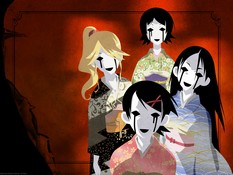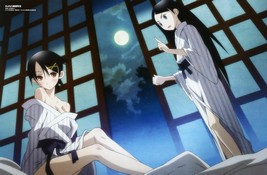It’s Like Rain On Your Wedding Day
June 26th, 2009
Isn’t it ironic that Alanis doesn’t know if it’s ironic?
WARNING WARNING
Self-indulgent intellectual ramblings about humor styles serving absolutely no purpose follows, predicated by days of boredom with no new episodes of anything to watch. This should not be consumed by small children, pregnant women, anybody above the age of 65, or anybody below the age of 65.
WARNING WARNING
If you understood the jokes I’ve already made in this post, then there’s a very good chance that you weren’t raised in Japan. Talking about the nature of humor is always a dicey issue since it’s entirely subjective and varies from person to person. Laughter is also very often a social reaction to other people laughing, creating a feedback loop of social acceptance and positive interaction. Babies giggle and coo to curry favor with their parents to make them forget that they’re living poop machines, and soulless executives insert laugh tracks for a similar purpose. However, once the brain develops enough to decide for itself what to respond positively, culture forms those reactions, and ironic or sarcastic humor is almost a lost art in Japanese media.
Instead, Japanese humor tends to be extremely focused on cross talk, but that’s certainly not unique to their culture. Cross talk relies on puns, wordplay, mutual misunderstandings, and typically boils down to one straight man, and one person playing the dunce. If that makes you think of Abbott and Costello’s "Who’s on first" as a classic western example, then you’re dead on. The problem with this for a western audience is in the translation, resulting in a copious number of cultural notes just to explain what the joke was, and the first rule of humor is that if you have to tell the audience when they’re supposed to laugh, the joke was a failure.
Interestingly though, animation provides a merging of styles that can actually make these puns work. While stand-up comics can’t employ visual imagery, animation can not only provide visual support for the puns, but add an absurdist side to the joke, allowing it to at least somewhat reach those that miss the lingual wordplay. Shaft has practically made this kind of visual wordplay into their trademark, although other studios certainly dabble in it from time to time. One doesn’t need to understand the twofold puns to laugh at Kawachi dancing a mambo with a melon seed stuck up his butt. In fact, given how bad those puns are, it probably helps if you don’t understand them.
The Art of Eating Sushi
Which isn’t to say that irony is totally unknown in Japan either, it’s just about as compartmentalized as cross talk is in the US. It’s certainly not absent either though. Comedian duo Rahmens has produced a number of deadpan "How To Be Japanese" videos (example above), and you see the good natured self-deprecation pretty much required for sarcasm show up a through a lot of doujin works. Instead, Japanese sarcasm just tends to be more reserved for invective rather than humor. It’s even practically institutionalized in parts of the language. Both Kisama and Onore are descended from far more polite addresses and have become the standard insult.
In comparison, British children are practically born sarcastic, and a treatise on the value of eating children is considered high art in the western world. While ironic and sarcastic humor are technically two different things, both rely on statements meant to be taken falsely and often insulting in some way. Some have even postulated that sarcasm is used as a way of identifying friends in a social clique by separating people into those who understand when a statement or opinion is true or false, a practice I’m sure many are familiar with on some of the more… shall we say… hives of scum and villainy on the internet.
Sarcasm is heavily based on critiquing and the speaker/writer’s lack of respect for the subject that it’s not surprising that it doesn’t flourish in the politeness that is so heavily ingrained into Japanese culture. It’s an insult to even use the wrong honorific, stating things falsely is something only the basest villain does. It does create a very unusual form of frank sincerity in their narratives, but that’s getting somewhat off-message. China’s influence on Japan also can’t be ignored. Despite lingering hatred from the Japanese invasions in the early 20th century, the two countries’ have worked together very closely. When Mao’s cultural revolution all but obliterated the rich Chinese sarcastic tradition (amongst other things), it would be naive to think that it wouldn’t reach to one of their strongest trade partners separated by only a small channel of water.
Like I said at the top, there really wasn’t any point I was trying to make here, just some random rambling for the sake of hearing my own voice. One form of humor is not necessarily better than the other, but the lack of sarcasm and irony in the anime I watch does make me appreciate western shows like 30 Rock and Better Off Ted that absolutely excel at using it all the more. That’s probably what sparked this flow of what likely amounts to little more than intellectual diarrhea. Shaft and Zetsubou Sensei’s dark humor on everyday things is about as close as I think Japan’s going to get for the immediate future and it’ll be nice to have it back again next week. I promise I’ll never try to educate anybody every again. At least… until the next time I get bored enough.
Posted in Deep Thoughts | 11 Comments »































































I’m too dumb;didn’t read